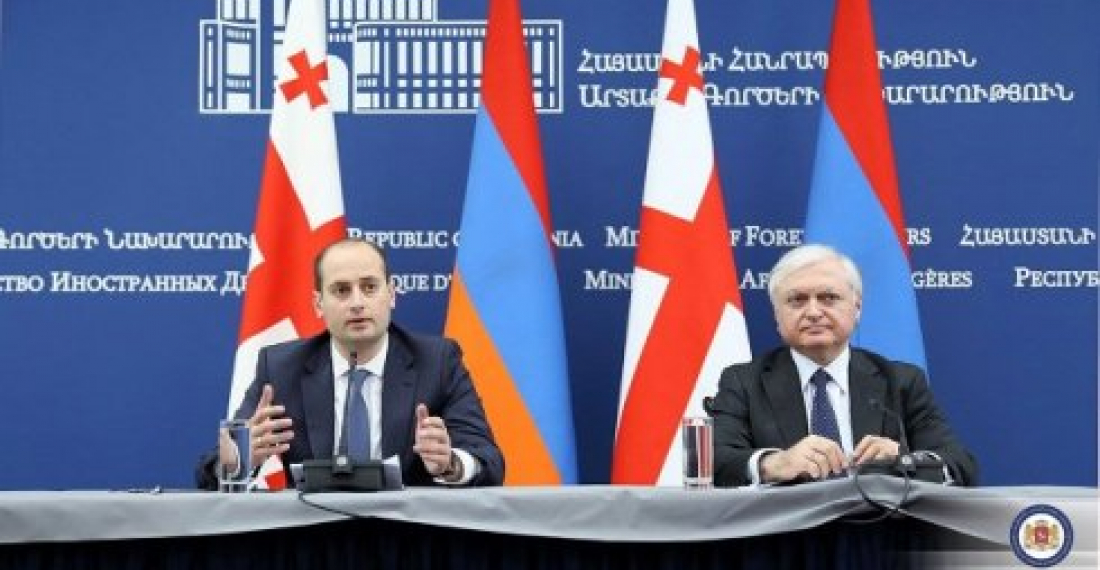Georgia and Armenia need to develop a strategic relationship in order to see off a number of geo-political challenges, argues Benyamin Poghosyan in this op-ed for commonspace.eu
Armenia and Georgia are both facing tough foreign policy challenges. Armenia has to deal with constant, joint, Azerbaijani-Turkish pressure over the Nagorno Karabakh conflict. Another hard task is the effort to develop relations with the Euro-Atlantic institutions, whilst simultaneously not jeopardizing strategic relations with Russia. The alliance with Moscow is itself a challenge given Armenia's overdependence on Russia, and Russia's growing cooperation with Turkey and Azerbaijan.
Armenia's isolation is only strengthening Russia's influence over Yerevan, therefore Russia has no interest to help Armenia become more accessible for international co-operation.
Armenia has friendly relations with Iran, but Tehran has limited influence in the South Caucasus. Iran's vital interests are in the Middle East where it has to deal with the momentum of a Saudi led anti-Iranian campaign, supported by the US and Israel.
Georgia is in a precarious situation too. The officially declared policy of euro-Atlantic integration has reached its limits, with almost zero chances of NATO or EU membership for the foreseeable future. The Association Agreement with DCFTA and visa free travel to Europe probably are the maximum which EU is able and willing to deliver. NATO membership is another non-realistic perspective, and Georgia has to satisfy itself with various aid programs and projects, but with no membership potential.
Meanwhile, the declared policy of Euro-Atlantic integration is a big irritator for Russia which sees the South Caucasus as a sphere of its legitimate interests, and perceives any attempts to bring Western institutions in the region as hostile actions. The situation is aggravated by Russia's decision to recognize the independence of Abkhazia and South Ossetia which makes any improvement in Russia-Georgia relations almost impossible.
Another feature in Georgia's foreign policy is its growing alliance with Azerbaijan and Turkey. Georgia is serving as a bridge connecting the two countries. Baku-Tbilisi-Jeyhan oil and Baku- Tbilisi-Erzurum gas pipelines, as well as the recently opened Baku - Tbilisi - Kars railway, are examples of such policy. Georgia certainly gains financial and geopolitical benefits from its transit role, but as a direct result of such policy Georgia is facing growing Turkish and Azerbaijani influence, with no clear option as to how to balance them.
In the current geopolitical juncture of the South Caucasus the development of a truly strategic partnership between Armenia and Georgia is a viable option, that may enable the two countries to overcome their geopolitical problems.
Armenia needs secure routes towards the outside world. Currently 70 percent of Armenia's trade passes through Georgia - either to Europe via the Black Sea, or to Russia via the Georgia - Russia land border. To counter Azerbaijani - Turkish pressure, as well as to seek ways to diminish its overdependence on Russia, Armenia needs to be involved in transit projects that are important for bigger players acting in the region. Given the upcoming signature of Comprehensive and Enhanced Partnership Agreement (CEPA) with the EU, as well as growing Chinese involvement in the region, the best solution for Armenia would be the inclusion in the transit corridor connecting China with EU. Chinese interests in Armenia may thus be used as a balancing factor countering Azerbaijan and Turkey.
The signature of CEPA may transform Armenia into a model of how states in post-soviet space may steer their relations with both Russia and EU. As a Eurasian Economic Union member state Armenia can be an example of how to be a member of Russia-led organizations, and sign cooperation agreements with the EU.
Meanwhile, any new transit project which may involve Armenia definitely should pass through Georgia. Georgia is a corridor for Armenia to be connected both with the EAEU and EU. In this context, raising relations with Georgia to the level of strategic partnership is vital for furthering Armenia's national interests.
Armenia is a vital partner for Georgia too. Given the deadlock with its relations with Russia, and with no perspectives for NATO or EU membership, Georgia may face the reality of a growing geopolitical and geo-economic dependence on Azerbaijan and Turkey. Georgia needs to balance its relations with Baku and Ankara. Both Iran and China are positioned well to be to provide such counterweight, and Armenia has a potential to serve as an important player here. Armenia is providing Georgia direct land access to Iran and can be a route for Iranian exports towards the EU via the Georgian Black Sea ports. If Georgia and Armenia achieve success in launching negotiations with China, Iran and EU to use the Iran - Black sea transit as an additional route for China - EU trade this will, in a tangible way, increase both countries geo-political potential.
Thus, both Armenia and Georgia need to change the current geopolitical status quo in the South Caucasus. Moves in that direction are more likely to succeed if they take them jointly. The development of a strategic partnership between the two countries will serve the vital national interests of Yerevan and Tbilisi, and will strengthen their positions in the region.
Source: Dr. Benyamin Poghosyan is the Executive Director of the Political Science Association of Armenia. He contributed this op-ed to commonspace.eu
Photo: The Foreign Ministers of Armenia and Georgia speaking at a press conference in Yerevan earlier this year. (Picture courtesy of the press service of the Ministry of foreign Affairs of Armenia)







